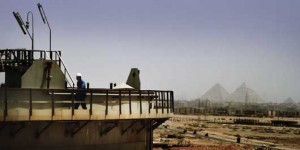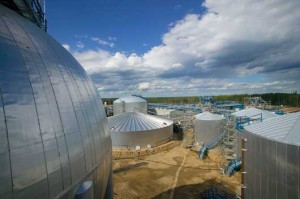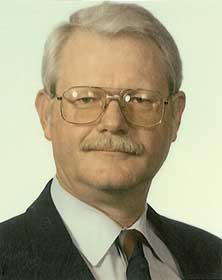Charlie McCoy couldn’t believe his eyes. Gas was flowing from a well into the sand and lying on the ground in the middle of it were dead quail. The Gulf employee accompanying McCoy said the well had a problem producing, that gas locked the downhole pump.
“I watched that pumping unit run and thought, ‘How can we use the pumping unit as energy to take the pressure off the well and not kill the quail?’’ He designed a Beam Gas Compressor, tried it on the well, and soon Gulf was buying his design. That was about 1980. Today, McCoy sells his units throughout the United States and they are in increasingly high demand in oil-producing countries. That demand keeps the mechanical engineer trotting around the globe.
McCoy with his Beam Gas Compressors comprises a small part of the export market based in the Permian Basin. It’s a growing industry that brings in more than a few dollars to local businesses. The current demand is for anything and everything connected to the petroleum industry.
Innovation. Education. Technology. The world seeks these products and the Permian Basin is supplying them in ever-increasing quantities.
McCoy’s Beam Gas Compressors is an example of how American ingenuity solved a problem involving many wells. “We increase production on existing rod pumping wells,” he explained. “We use the energy from the pumping unit that is already on location as the prime mover for our equipment. This piece of equipment relieves the back pressures in the formation and allows the formation to produce at its maximum rate. The beam gas compressor also increases the efficiency of the downhole pump.” Used in Oman, it allowed an average increase of 80 barrels a day per well. In California, that average increase was 20 barrels a day.
Every continent in the world, except for Antarctica, is buying products with the words “Made in the USA” and “Texas” stamped on them. Just as technology has driven the growing need for Permian Basin products, it also has broken down barriers in the export market. In 2004, the U.S. Commerce Department opened the West Texas U.S. Export Assistance Center at the Center for Energy and Economic Development on FM 1788, located between Midland and Odessa. Staffed by Harry Henson as its director, the Export Office operates under the theme “The world is open for business. There is a big push for products made in the USA. International people like our products.”
The Export Office essentially guides interested business people along the road to exporting products and works to eliminate detours. “Our services are free to anyone who has a question about exporting,” Henson said.
Among those services listed on the website at www.export.gov are identifying and evaluating international partners, navigating international documentation challenges, creating market entry strategies, and providing other export-related guidance.

Apache is the largest producer of liquid hydrocarbons and natural gas in Egypt's Western Desert and is Egypt's second-largest producer overall.
“Anything and everything to do with oil and gas can be exported out of the Permian Basin,” he added. A short list of products exported from the Permian Basin include gas collections systems for methane gas, drilling rigs, service pipelines, metering gauges, pumps, sucker rods, and engineering services. And those are just the tip of the iceberg.
Charges are incurred when a company needs the services of the U.S. Embassy in a specific country, Henson noted. If a businessman wants to export his company’s products to a certain country, the Export Assistance Office will compile a bio on the company and send it to the U.S. Embassy in that country. Embassy personnel will put together a list of four to six contacts who express an interest in pursuing business with that company.
“Some companies want to open an office in a foreign country and they then need to hire an international lawyer to learn the rules and regulations of that country,” Henson noted.
Most companies, though, opt to establish relationships with “agents” in those countries. McCoy said he works through distributors and/or agents. “In some countries, I have developed a relationship with existing service companies there. They become a distributor or agent for my product. The distributor purchases it from me and then sells it to the user. When I use an agent, he helps me to come in and make a sale to a customer. I do all the work and pay him a finder’s fee. The agent doesn’t want to buy my product and then re-sell it.”
Increasingly, Permian Basin firms are finding themselves being contacted by foreign companies seeking their products. Although area companies admittedly are in the middle of a boom and are scrambling to produce enough to meet U.S. demand, the international market is adding substantially to their bottom line. During times when the local economy isn’t booming, these international markets can help local businesses keep their doors open, according to Henson.
Texas has ranked No. 1 in exports among U.S. states for the past 10 years, according to numbers Henson obtained through the U.S. Census Bureau. In 2011, Texas exported almost $250 billion worth of goods. California was second with $159 billion. Of Texas’ number, almost $87 billion went to Mexico, $21.9 billion to Canada, $10.9 billion to China (yes, TO China), and $10 billion to Brazil.
Permian Basin cities are enjoying their own growing export numbers. In 2008, Odessa shipped out $156 million in products, $188 million in 2009, and $109 million during the first half of 2010, according to figures Henson obtained from the Census Bureau. Midland exported $93 million in 2008, $75 million in 2009, and $34 million in the first half of 2010. San Angelo’s figures were $145 million, $172 million, and $74 million, respectively.
Finding markets for local products—even those not directly related to the petroleum industry—is easier than one thinks. At export.gov, the website lists various trade shows, locations, and dates, as well as details on what companies are seeking. The Offshore Technology Conference is scheduled April 30-May 3 at Reliant Center in Houston. It is described as “the world’s foremost event for the development of offshore resources in the fields of drilling, exploration, production and environmental protection.” In 2011, attendance hit a record high of 78,150.
Maybe the “Made in America 2012” show in Lebanon would tickle another manufacturer’s fancy. Running from March 28-31, this trade fair promotes U.S. products and services in Lebanon. “Last held in 2008, this fair featured 271 U.S. companies active in a wide variety of sectors, and reported dozens of export successes as a direct result of the fair,” the website noted.
And there is the “Selling to Brazil, China, South Korea & Vietnam/ASEAN” conference coming up March 21-23 at Xavier University in Cincinnati, Ohio. It is designed to focus on “hot markets” in those countries. Senior commercial officers from those countries are expected, the website noted.
Helping companies with all the details to start exporting is part of Henson’s job. When someone asks about exporting his company’s product, Henson raises numerous issues to consider: Why do they want to market overseas? Has competition been exporting the same item? Have they had contacts from overseas buyers? What country is their target for exporting? Can they provide support to an overseas distributor? He suggests companies consider attending trade shows, such as the ones listed above.
“Foreign delegations come in and want to meet American manufacturers. They will go to these shows. It gives you an opportunity to start building relationships of trust,” Henson said. And Americans attending foreign trade shows make an even bigger impression.
Selling a product outside the U.S., even if it’s not related to the petroleum industry, can be easier than one thinks. “There is a strong desire to buy products made in the U.S.A.,” Henson said. “People know it’s a quality product.”
Some countries require a Certificate of Origin to prove the product was manufactured in the United States, and chambers of commerce can produce those. In Odessa, Sally Holloway, economic development specialist with the chamber, has issued these certificates to Eckel International, Avtelcom, Magniflo Corporation, United Industries, Ray’s Equipment, Electronic Data Services, MD Cowan, Inc., and A-1 Gasket & Industrial Supply, Inc.
John Crane Production Solutions is one of many firms that have discovered how much foreign countries value American craftsmanship. Fiberglass sucker rods are manufactured in Big Spring and steel rods in Tyler. With distribution warehouses in Big Spring and Midland, 25 percent of the company’s total revenues come from international business, noted Jeremie Alley, director of marketing. The firm has 22 offices spread across the United States, plus an office in Romania and agents in other countries.
“We are the Upstream Division of John Crane,” Alley said. “We export steel rods, pump parts, and complete pump assemblies.” Downhole equipment is shipped to Indonesia, Australia, and South America. One of the company’s best clients is Romania, where John Crane is the well-servicing company for Petrom, the country’s national oil company.
“Petrom owns 19 pump shops and we contract to run them. We have to supply the parts to manage those shops, and that includes rods, couplings, pump-off controllers, and artificial lift equipment.”
As a result of increased demand, the Big Spring plant expanded from four machines to six to produce the glass rods, and that translated into more jobs created, according to Alley.

Devon's Jackfish oil sands project, a steam-assisted gravity drainage operation, produced about 35,000 gross barrels of oil per day in 2009.
When McCoy designed his Beam Gas Compressor, he never considered exporting it. The Permian Basin was in the midst of a drilling boom and he had moved his family to Midland from Dallas. With an office in Midland, McCoy located the manufacturing plant south of Midland International Airport. Many sales were generated by word of mouth. Today, Beam Gas Compressors are sold to Oxy, ExxonMobil, ConocoPhillips, Pioneer, Crownquest, Chesapeake, and Sandridge, just to name a few. Internationally, these units are found in Canada, Indonesia, Peru, Ecuador, Columbia, Venezuela, Argentina, Austria, Germany, Hungary, Romania, Kuwait, Oman, England, and Russia.
McCoy’s travels have taken him around the world more than once as he oversees installation of the units.
“When I first came here and looked at all the production and wells within 200 miles of Midland, I thought I would be spending every night at home the rest of my life,” McCoy reflected. Instead, he spends many nights each month in some part of the world.
And all because he couldn’t stand seeing dead quail in a pool of gas.
By Lana Cunningham
April: A look at the technology, equipment, and personnel that go overseas as companies expand international operations.










